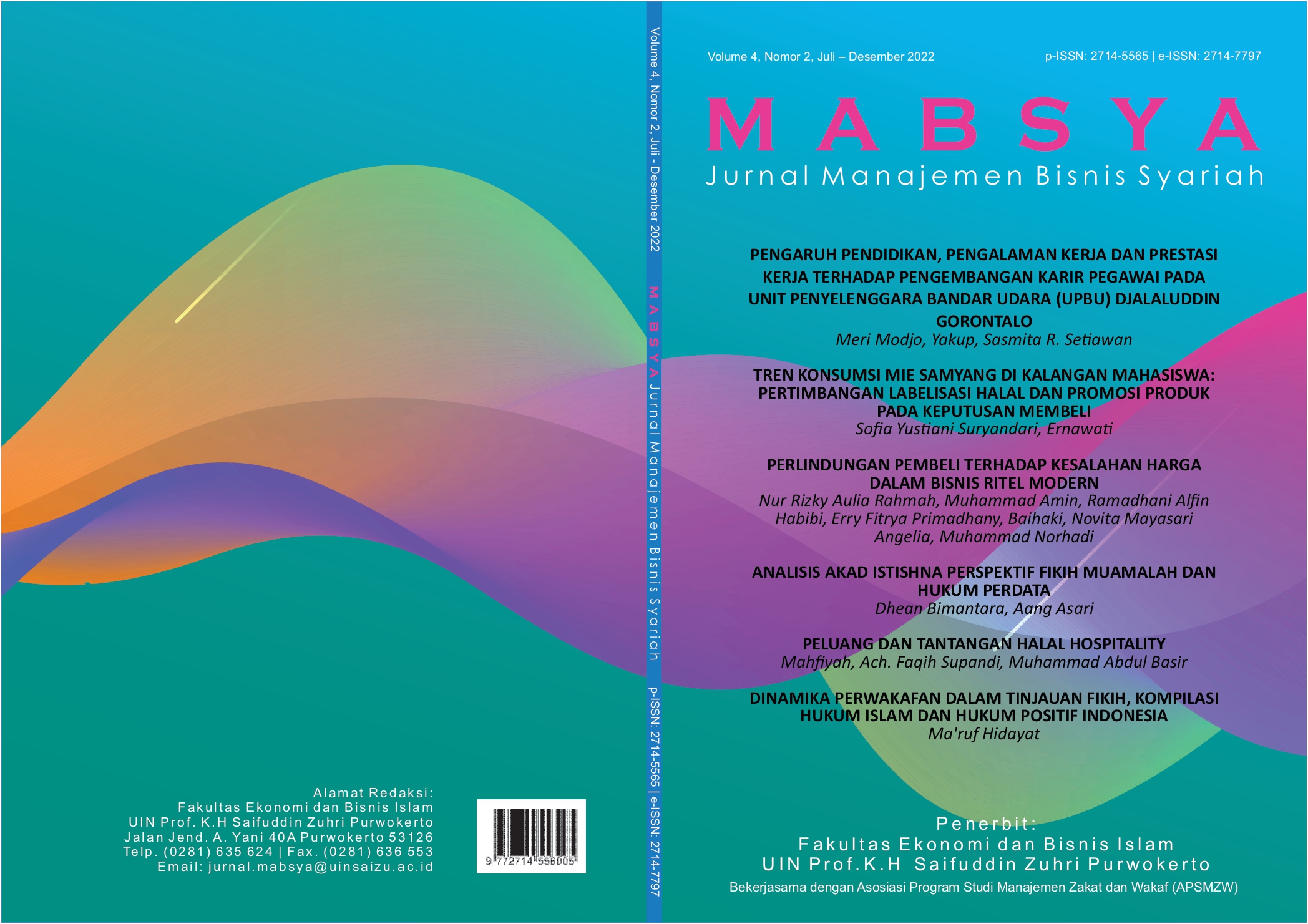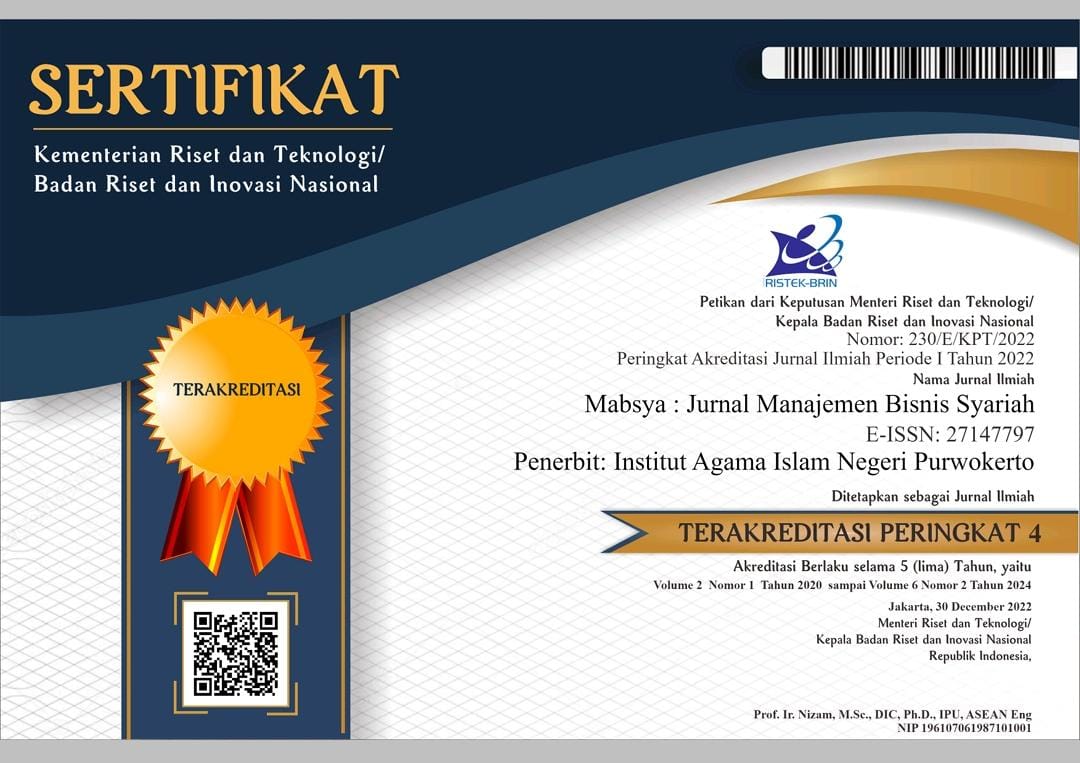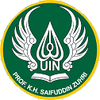Tren Konsumsi Mie Samyang di Kalangan Mahasiswa: Pertimbangan Labelisasi Halal dan Promosi Produk Pada Keputusan Membeli
DOI:
https://doi.org/10.24090/mabsya.v4i2.6666Keywords:
Halal Labeling, Promotion, Purchasing Decision, Rank Spearman, Kendal W, Ordinal RegressionAbstract
Purchasing decisions are the actions of consumers to be willing to buy or not against a product. Many factors can influence a consumer's purchasing decision on a product. Therefore, entrepreneurs are required to understand the behavior of consumers in purchasing, especially in Indonesia whose people are the majority of Muslim consumers, one of which is by halal labeling and promotion. The review means to examine the impact of halal naming and advancement on the buying choices of Samyang noodel. This study utilizes quantitative examination strategies. The populace in this study was understudies at UIN Prof. KH. Saifuddin Zuhri Purwokerto. The testing strategy utilized is non-likelihood inspecting with purposive examining procedure utilizing 100 essential information acquired from polls. Information examination is done through spearman rank connection, composed concordance of kendal w and ordinal relapse investigation utilizing SPSS. The results of the study using spearman rank correlation analysis can be concluded that halal labelization and partial promotion have a positive and significant effect on purchasing decisions. With the results of the correlation coefficient of halal labelization variables with purchase decisions of 0.838 and coefficients of correlation of promotional variables with purchasing decisions of 0.848. While the correlation of kendal w concordance of 0.430 showed a simultaneous relationship between halal labeling and promotion of purchase decisions in a positive direction, while ordinal regression testing on the Fitting Information model table showed that both independent variables of halal labeling and promotion significantly affected the decision to purchase Samyang noodle in students at UIN Prof. KH. Saifuddin Zuhri Purwokerto.References
Baker, Ahmad. 2010. “On Islamic Branding: Brands as Good Deeds”. dalam Journal of Islamic Marketing. Vol. 1, No. 2.
Chairina, Kusumaningrum. 2016. “Pengaruh Labelisasi Halal dan Promosi Terhadap Keputusan Pembelian Produk Makanan Dalam Kemasan (Studi Kasus di Masyarakat Kecamatan Lowokwaru Kota Malang)”, Skripsi. Malang: Fakultas Ekonomi dan Bisnis Universitas Brawijaya.
Dony, Indra Permana. 2017. “Pengaruh Promosi Terhadap Keputusan Pembelian Produk Lantai Kayu Dan Pintu PT. Piji Di Jawa Timur” dalam Jurnal Manajemen dan Start-Up Bisnis, Vol. 2, No. 1.
Hasan, K. S. 2014. “Kepastian Hukum Sertifikasi dan Labelisasi Halal Produk Pangan”. dalam Jurnal Dinamika Hukum. Vol. 14, No. 2.
Kotler, dan G. Armstrong. 2006. Prinsip-Prinsip Pemasaran Edisi Kedua belas. Jakarta: PT. Gelora Aksara Pratama.
Kotler, Philip. 2008. Manajemen Pemasaran: Jilid 1 Edisi Tiga belas. Jakarta: PT. Gelora Aksara Pratama.
Lupiyoadi, Rambat. 2013. Manajemen Pemasaran Jasa Berbasis Kompetensi Edisi 3. Jakarta: Salemba Empat.
Ramlan dan Nahrowi. 2014. “Sertifikasi Halal sebagai Penerapan Etika Bisnis dalam Upaya Perlindungan bagi Konsumen Muslim” dalam Jurnal Ahkam. Vol. 14, No. 1.
Riyanto, Slamet, dan Hatmawan Andhita Aglis. 2020. Metode Riset penelitian Kuantitatif. Yogyakarta: CV BUDI UTAMA.
Siregar, Syofian. 2014. Metode Penelitian Kuantitatif: dilengkapi dengan perbandingan perhitungan manual dan SPSS. Jakarta: Kencana.
Sukoso, et al. 2020. Ekosistem Industri Halal. Jakarta: Departemen Ekonomi Dan Keuangan Syariah – Bank Indonesia
Tjiptono, Fandy. 2008. Strategi Pemasaran. Yogyakarta: CV Andi.
UU Nomor 69 Tahun 1999 Tentang Label Dan Iklan Pangan.
World Population Review. “Muslim Population by Country 2020”, diakses 20 Agustus 2021 dari https://worldpopulationreview.com/country rankings/muslim-population-by-country, pukul 21.15 WIB.
Wulan, Nor. S. Hastuti, et al. 2013. “Pengaruh Label Halal Pada Kemasan Terhadap Keputusan Pembelian Produk Es Krim” dalam Jurnal Seminar Nasional: Menggagas Kebangkitan Komoditas Unggulan Lokal Pertanian Dan Kelautan Fakultas Pertanian Universitas Trunojoyo Madura.
Aziz, F. A. (2020). Menakar Kesyariahan Fintech Syariah di Indonesia. Al-Manahij: Jurnal Kajian Hukum Islam, 14 (1), 1-18.
Aziz, F. A. & Irfangi A. (2021). Analysis of Profit-Sharing Knowledge and Bank Interest on Understanding of Sharia Banking Operational Management and Its Implications for Saving Students in Sharia Banking. PalArch's Journal of Archaeology of Egypt/Egyptology, 18 (3), 525-538.
Aziz, F. A., Irfangi, A., Dharin, A. (2022). The Role of Information Technology and Supply Chain Collaboration in Enhancing Innovation. International Journal of Construction Supply Chain Management, 12 (2), 143-156.
Aziz, F. A., Utami, H. T., Wanojaleni, K. (2022). Socio-Economic Factors, Islamic Financial Literacy and Personal Financial Management in University Lecturers in Indonesia. Baltic Journal of Law & Politics, 15 (2), 22-31.
Aziz, F. & Utami, H. T. (2019). The Influence of the Use of Accounting Information and Information Technology on the Success of Business Performance (A Survey on Micro, Small and Medium Enterprises (MSMEs) of Superior Products in Banyumas Regency), KnE Social Sciences.
Aziz, J. A., & Uswatusolihah, U. (2022). The Dichotomy Between Tabarru’and Mu’âwaḍah Contracts: Perspective of Indonesian Law of Obligation. Al-Manahij: Jurnal Kajian Hukum Islam, 16 (1), 103-114.
Syah, T. A., Kharismasyah, A. Y., Darmawan, A., & Aziz, J. A. (2021). Macro variables and bank peculiar variable on profitability: empirical study of islamic banking in Indonesia. International Journal of Information, Business and Management, 13(1), 79-92.
Aziz, J. A., & Uswatusolihah, U. (2022). The Dichotomy Between Tabarru’and Mu’âwaḍah Contracts: Perspective of Indonesian Law of Obligation. Al-Manahij: Jurnal Kajian Hukum Islam, 16(1), 103-114.
Dahlan, A., & Wildan, M. (2022). Analisis Ekonomi Politik Terhadap Kebijakan Pemerintahan Jokowi Pada Sektor Kawasan Industri Halal (KIH) dan Perbankan Syariah. el-Jizya: Jurnal Ekonomi Islam, 10(2).
Warsito, C. (2024). Performance of Cultural Tourism: Mediating Role of Perceived Destination Quality. Quality-Access to Success, 25(198).
Sulasih, S., Suroso, A., Novandari, W., & Suliyanto, S. (2022). The role of digital technology in people-centered development: the basic needs approach in the Kampung Marketer Program. Jurnal Perspektif Pembiayaan Dan Pembangunan Daerah, 9(6), 493-502.
Downloads
Published
How to Cite
Issue
Section
License
Copyright (c) 2022 Sofia Yustiani, Ernawati Ernawati

This work is licensed under a Creative Commons Attribution 4.0 International License.
Authors who publish with this journal agree to the following terms: Authors retain copyright and grant the journal right of first publication with the work simultaneously licensed under a Creative Commons Attribution 4.0 International License that allows others to share the work with an acknowledgment of the work's authorship and initial publication in this journal.














